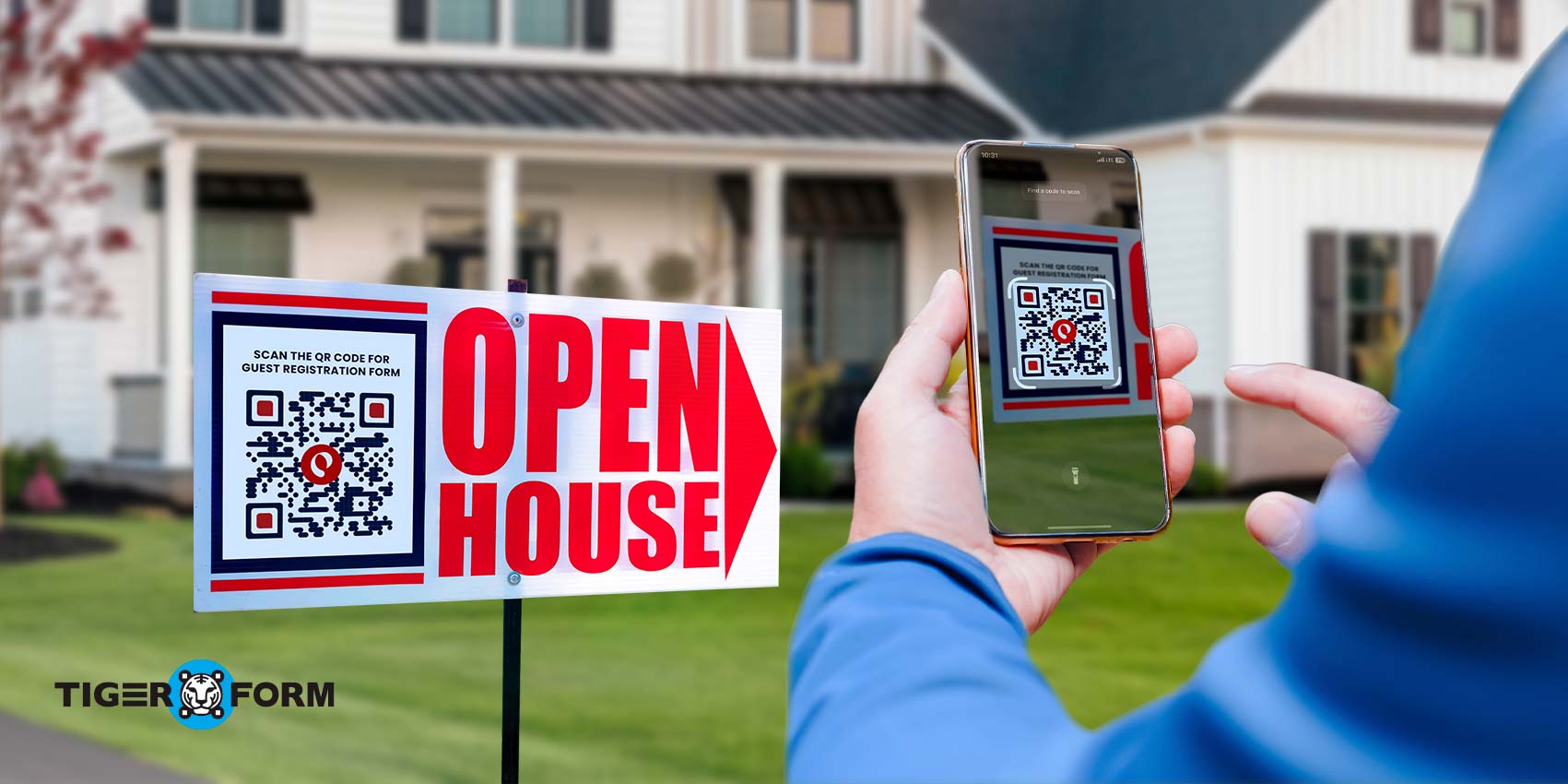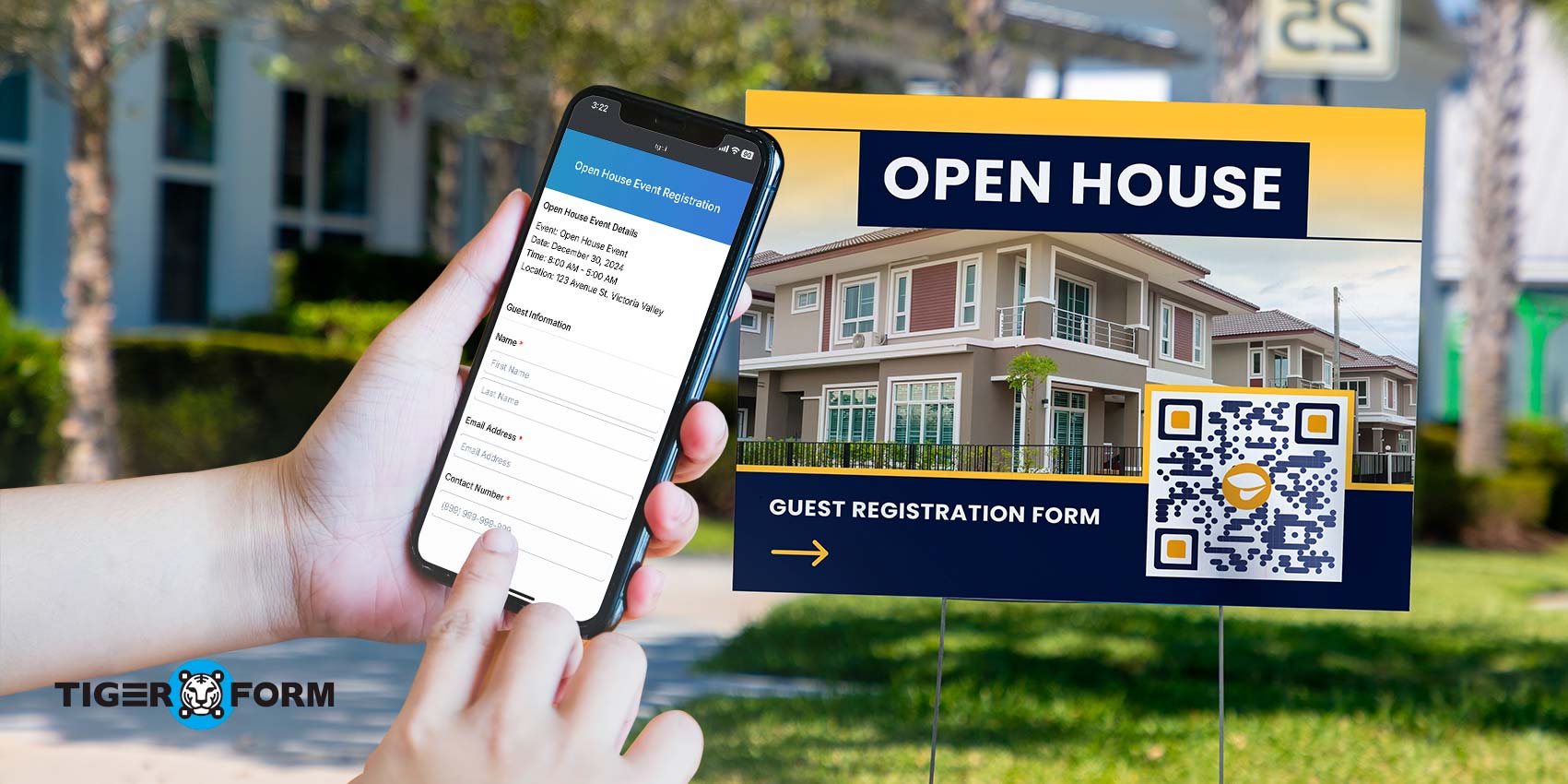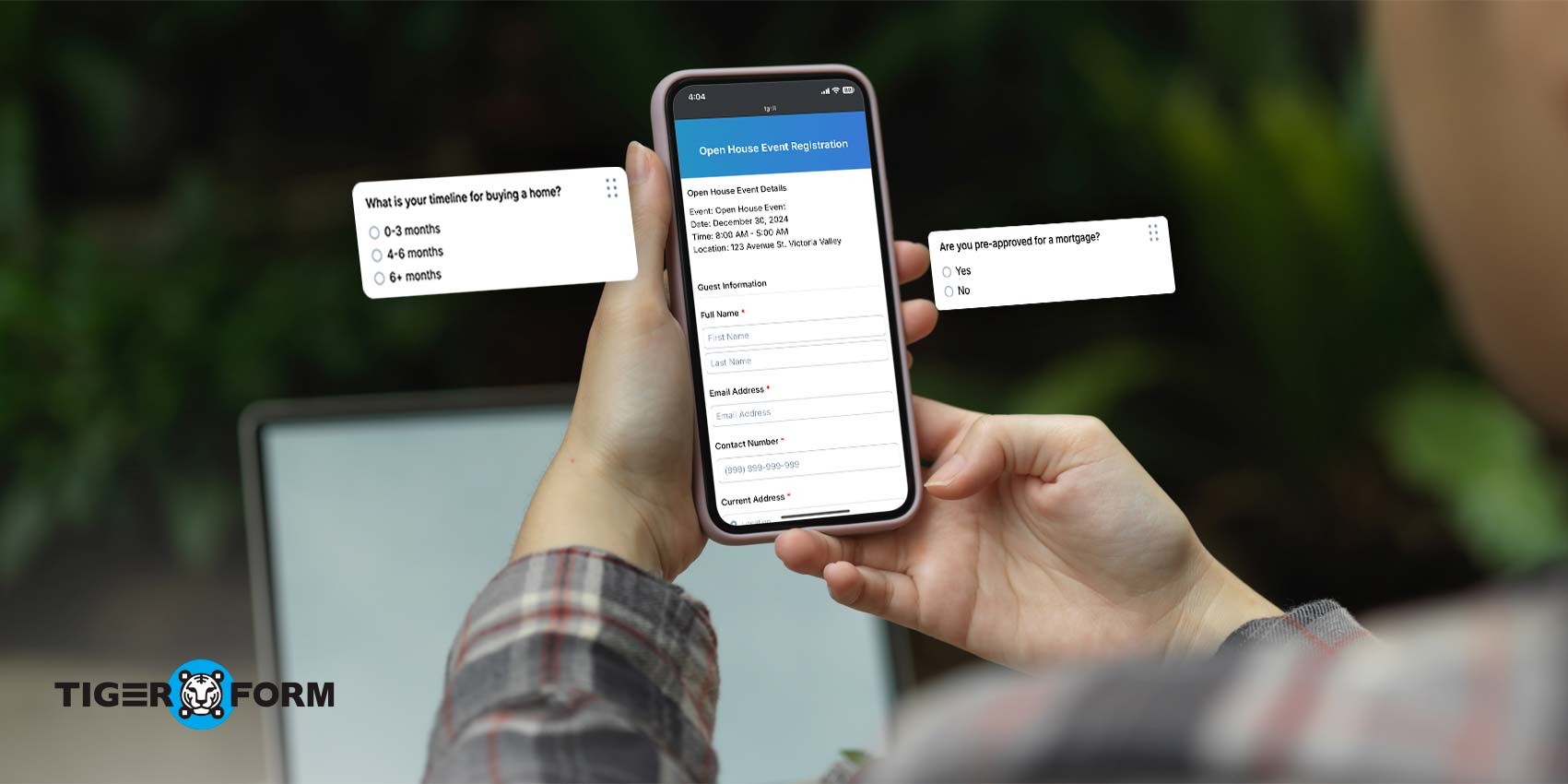
Open houses are essential marketing tools in real estate. They let buyers visit, ask questions, and imagine living in a property. 41% of homebuyers used open houses to aid their search, showing their value in showcasing neighborhoods and properties. Yet gathering and organizing attendee information can be challenging.
Traditionally, open house visitors would fill out paper forms, leading to incomplete information, mistakes, and delayed follow-ups. With modern digital tools, though, agents can now simplify the experience by using an open house registration form for real estate. These digital forms streamline the process, making it easy to create, share, and manage registration information, saving time and improving data accuracy.
QR codes integrated with digital forms collect all registration details automatically—no more paper shuffling—just quick, contactless check-ins. The data also reveals peak attendance times, allowing future events to be optimized. Let’s find out how!
Why does the open house registration form for real estate matter?
Open houses can attract many attendees. It’s vital to have a way to capture their contact information and other details. The old method of using pen and paper can cause several problems, including:
- Agents must manually input attendee information into their databases after the event. This is labor-intensive and error-prone.
- Not everyone writes clearly. This can cause errors, missed follow-ups, and lost leads.
- Agents may not use manual forms to capture all the data needed to qualify leads.
- Visitors might feel frustrated if they wait in line to fill out a paper form at a busy open house.
A digital solution can simplify the open house registration form for real estate. It can reduce challenges, improve lead management, and enhance the attendee experience.
Benefits of using a form builder for open house registration for Realtors
When selling a house or merely trying to get attention for a home you are selling, you would want people to turn up in large numbers. An open house registration form system using the TIGER FORM will help improve the number of people who turn up for the open house. Here are some of the benefits of it:
Well-organized data collection
Online form software makes open house registration quick and easy. Attendees can enter their info on their devices or at a digital hub.
These forms ensure all needed info is collected and prevent issues with bad handwriting. This leads to accurate data for marketing and nurturing leads.
Seamless integration with CRM
Form creators work well with customer relationship management (CRM) systems. This is vital for real estate agents. Once someone registers, their information goes straight to the CRM. This eliminates manual entry, allowing agents to track leads and better plan future contacts.
Customizable design
Real estate agents can easily tailor forms to match their brand and needs. They can add fields for:
- Name, phone number, and email
- Preferred property type
- Home buying timeline
- Budget Range
- Referral source
This customization ensures a quick, easy process for attendees.
Mobile-friendly experience

Digital builders create mobile-responsive forms. Agents can offer a real estate QR code at the open house for easy access. This reduces lines and enhances the experience.
Automation and instant responses
Online form platforms allow for automated responses after someone fills out a form. For instance, you can send a confirmation or thank-you email with property details. This quick follow-up impresses and engages potential buyers.
Data security and privacy compliance
Online software focuses on data protection. They include security features to safeguard info and comply with regulations like GDPR or CCPA. This builds client trust.
Tracking and reporting
Free-form online builders often use analytics to track submissions. Agents gain insights into attendance, lead generation, and marketing success, which helps refine future strategies.
Steps to create a QR code form for open house registration
With the benefits of a registration QR code system understood, it’s time to roll up your sleeves and construct one. The process involves five straightforward steps that will have your code up and running in no time.
Choose a reputable builder
Several reputable options exist for creating the digital form attached to your QR code. Google Forms is a popular, free, and intuitive form maker platform. Leverage a combination of Google Form QR codes to ensure high compatibility. Its branded surveys also help increase your code’s credibility.
When selecting a platform, consider the following factors:
- Ease of use: The platform should offer a simple drag-and-drop interface for adding and arranging fields.
- Customization options: It should allow you to brand the form with your logo and color scheme.
- Integrations: Ensure the builder integrates with your CRM or email marketing software.
- Security features: The platform should offer encryption and compliance with data protection regulations.
Add essential fields for the open house registration form for real estate
Craft a form requesting connected details with your chosen form software for open house registration. Ensure that fields for name, phone number, and email address are included at the minimum. This allows later correspondence to answer follow-up questions or share new listings. Focus on simplicity by including the most relevant questions.
Some builders offer form templates specifically designed for real estate events, saving you time in the setup process. Additional helpful fields cover how guests heard about your event or which property interests them most. Customization helps you better engage prospects who are likely to become buyers.
Create a QR code for the form
Now, create the QR code linking to the form using a free QR code generator.
First, copy the form URL from your dashboard. Then, paste it into the generator’s text box and click “Generate QR Code.” This step connects the form to a scannable code.
Customize the QR code design
Most generous QR code generators let you adjust colors, graphics, and style elements. Personalize your code to reflect agency shades or seasonal branding. An easily identifiable design, reinforced by shape adjustments, may increase scan rates.
Adding your company logo places ownership and builds familiarity from the start. A dynamic code in your open house registration app permitting design changes keeps your form entrance up to date as marketing evolves.
Connect your form to CRM and analytics tools
First, link your open house registration form online to your CRM. This automatically adds attendee data to your lead database. Then, use the builder’s analytics to track submissions and analyze trends.
Test and publish the open house registration form online
Before your open house, test the form on smartphones, tablets, and desktops to ensure it works well. Once satisfied, publish the form and use it at your events.
Real-life use cases of QR code registration forms
Now that you have a QR code for a digital form, use it well. Properties, agencies, and related businesses show how to use creative QR code check-ins.
Event registration
Open houses are perfect for QR code sign-ups. Yet, these codes work for any industry meet-up, too.
QR code on name badges or flyers can be scanned at real estate conferences. Attendees then easily RSVP using quick forms on their devices. Event planners also gain automatic headcounts and insights.
Appointment scheduling
QR codes make booking private meetings with agents or professionals easy. Agents put scannable codes on their business cards, which link directly to their calendars.
Clients find booking easier via a scan than searching on public computers. This method keeps appointment data organized and saves time.
Lead collection
Marketers use QR codes, signs, and other powerful tools in the mail. Scanning these codes registers interested prospects. Forms then collect names and numbers, feeding databases. Marketers follow up with tailored recommendations or discounts, nurturing leads into buyers.
Too much information can overwhelm you. A single scan offers personalized property info, keeping interest. Forms then ask for emails to share relevant content. These examples show the real value of QR code registration. Businesses are using these codes to advance in the market, and your agency could benefit from them, too.

Tips to simplify open house registration form
Here are some tips to make a registration form easier and better for attendees:
- Share the form through email or social media before the event.
- Offer QR codes and NFC for easy sign-ins. Attendees can just tap their phones to register, avoiding long lines.
- Keep essential questions only. Too many can scare people off. Make others optional.
- Offer Incentives and small gifts to encourage form-filling. People are more likely to share information if they get something.
- Ensure the form loads quickly and is easy to use. Test it beforehand.
- Tailor the form based on responses. This makes it simpler and more personal.
- Use direct prompts like “Register Here” next to the code. Test different phrases to see which one gets more sign-ups.
- Place your code where it’s easy to see. Codes on signs parallel to walkways scan better, and bigger codes on posters are easier to read than business cards.
- Keep branding consistent. Use property photos, agency colors, and logos in the QR code. Custom shapes, like keys, can enhance identity.
- • Check everything before the event. Scan the QR code to check its functionality. Test the form and its fields, too. Fix any issues early.
Following these tips makes your QR code check-in more than just a formality. It showcases your brand and attracts buyers. Easy, recognizable codes leave a good impression. This gives your agency an edge over competitors.
The future of open house registration with AI and automation
As technology evolves, form platforms will likely add advanced AI features. They further simplify the open house registration form for real estate professionals. Here are a few trends to watch:
AI-driven lead scoring
Online form makers for open house registration could integrate AI algorithms that analyze attendee data in real time. These algorithms automatically score leads based on their responses and behavior. This would allow agents to focus on following up with the most qualified prospects immediately.
Voice-activated registration
In the future, attendees might sign in with voice commands, similar to virtual assistants (VA) like Alexa or Siri. This could make sign-in smoother and lessen the need for physical contact.
Predictive analytics
Real estate agents could get tips by using the builder’s predictive analytics. These would help them optimize their forms for different demographics, improving completion rates and data quality.
Deeper CRM integrations
As CRMs get more advanced, form software will likely offer better integrations. This will let agents pull more detailed insights from attendee data. They can then send more personalized follow-ups.

Create an open house registration form using TIGER FORM
Using digital tools like form makers and QR codes, real estate agents can simplify open house registration forms for real estate. This approach solves many problems with paper forms. It makes signing up easy, ensures accurate data, and enhances the visitor experience.
Features like Google Forms, CRM links, and automatic replies boost productivity. This enables agents to focus on leads and improve future events. Moreover, AI and predictive analytics are set to enhance these tools, offering smarter, more personalized management. Adopting these technologies saves time, strengthens client relationships, and improves success in a competitive market.
